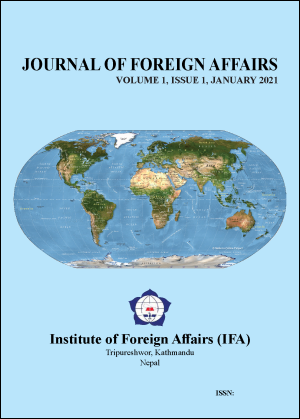Ethos of ‘Vasudhaiva Kutumbakam’ in Nepal’s Contribution to UN Peacekeeping Operations
DOI:
https://doi.org/10.3126/jofa.v1i1.36253Keywords:
Peacekeeping, Vasudhaiva Kutumbakam, United Nations, Peacekeeping Operations, Nepali Peacekeepers, NepalAbstract
After joining the United Nations in 1955, Nepal not only initiated its non-isolationist foreign policy, but also effectively championed the policy of non-alignment, world peace and non-intervention at several multilateral forums and UN bodies. The most outstanding and globally applauded effort has been Nepal’s contribution in the maintenance of global peace and security through UN peacekeeping missions. Adhering to the eastern philosophy of ‘Vasudhaiva Kutumbakam’, which envisions the entire world as one family, today, Nepal is the 5th largest troop contributor to the United Nations Peacekeeping Operations (UNPKO). But most of the literature produced on Nepal’s role in the United Nations peacekeeping mission are either too general and mere archival or focussed only on glorifying the contribution of Nepali soldiers in different peacekeeping missions. Identifying the same research gap, this study aims to appraise Nepal’s participation in UN peacekeeping missions from Nepal’s foreign policy objective of world peace. To fulfill the same objective, the ethos of Vasudhaiva Kutumbakam has been foregrounded in the study. Initially, the general understanding of UN peacekeeping in Nepal was associated with bravery, which was later replaced by the concept of ‘kamaune’, which means to earn from the missions. But this study has deliberately cloaked the economic variable of peacekeeping and foregrounds the philosophical drive to highlight how Nepal’s peacekeeping should find more places in political and foreign policy measurement rather than being confined to the financial and institutional variables.
Downloads
Downloads
Published
How to Cite
Issue
Section
License
© Institute of Foreign Affairs

